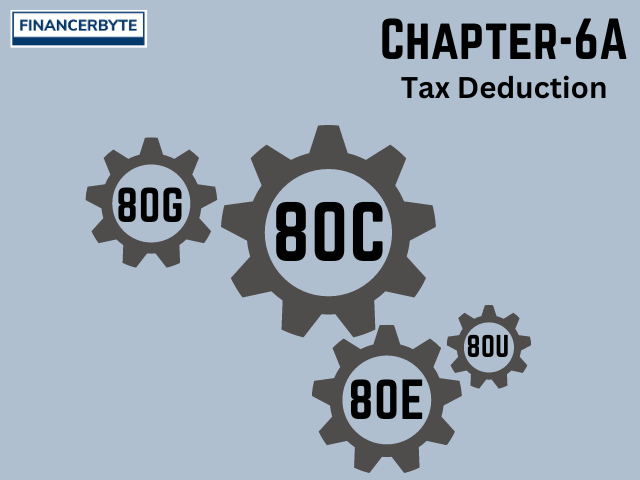
Unlocking the Power of Chapter 6A: Your Guide to Income Tax Deductions in India
Chapter 6A of the Income Tax Act provides deductions to taxpayers for contributions to PPF, EPF, life insurance policies, tuition fees, and donations. Learn how to take advantage of these deductions and save on taxes.
Unlocking the Power of Chapter 6A: Your Guide to Income Tax Deductions in India
Unlock the full potential of Chapter 6A deductions with our comprehensive guide, featuring clear headings and expertly crafted content. Don't miss out on valuable tax-saving opportunities – start optimizing your finances today!
Chapter 6A of the Indian Income Tax Act, 1961 provides for deductions to be claimed by individuals and Hindu Undivided Families (HUFs) in computing their total taxable income. This chapter includes various sections, including section 80C, 80CCC, 80CCD, 80D, 80DD, 80DDB, 80E, 80EE, 80G, 80GG, 80GGA, 80GGC, and 80U.
It is important to note that the deduction amount under each section and the eligibility criteria may differ, and taxpayers must carefully read and understand the provisions before claiming any deductions.
Section 80C: Deduction in respect of certain investments
Under this section, an individual or HUF can claim a deduction of up to Rs. 1.5 lakhs in a financial year by investing in specified instruments. These instruments include Equity-Linked Savings Scheme (ELSS), Public Provident Fund (PPF), National Savings Certificate (NSC), Tax-Saving Fixed Deposits (FDs), and others. The deduction is available for investments made by the taxpayer for their own benefit, or for the benefit of their spouse, or children.
-
Subsection of 80C
-
Section 80CCC : Saving for Retirement
Taxpayers can claim a deduction of up to Rs. 1.5 lakh for contributions made by an individual to a pension fund. The pension fund should be administered by the Central Government or any other approved institution. Section 80CCC allows for a deduction on pension contributions for all eligible taxpayers, including both salaried and self-employed individuals.
-
Section 80CCD: Deduction for contribution to the National Pension System (NPS)
Section 80CCD offers taxpayers an additional deduction of up to Rs. 1.5 lakhs for pension contributions, regardless of employment status.This is in addition to the deduction allowed under Section 80CCC. Both salaried and self-employed individuals can claim the deduction for pension contributions under Section 80CCC.
-
Section 80D: Deduction for medical insurance premium
Under this section, an individual or HUF can claim a deduction for medical insurance premiums paid for themselves, their spouse, and dependent children. The deduction limit is up to Rs. 25,000, and for senior citizens, the limit is up to Rs. 50,000. An additional deduction of up to Rs. 5,000 is available for preventive health check-ups.
-
Subsection of 80D
-
Section 80DD: Deduction for medical treatment of a disabled dependent
Section 80DDB offers a deduction of up to Rs. 75,000 for eligible medical expenses of a dependent with a disability. If the taxpayer is severely disabled, they may be eligible for a deduction limit of up to Rs. 1.25 lakhs under Section 80DD.
-
Section 80DDB: Tax Deduction for Medical Treatment of Specified Diseases
Taxpayers can claim a deduction of up to Rs. 40,000 (Rs. 1 lakh for senior citizens) under Section 80DDB for medical treatment of specified diseases such as cancer, neurological disorders, and chronic renal failure, among others.
-
Section 80E: Tax Deduction for Interest Paid on Education Loan
This section allows for a deduction of the entire interest paid on an education loan for a maximum period of 8 years. The loan should have been taken for higher education of the taxpayer, their spouse, or children.
-
Subsection of 80E
-
Section 80EE: Deduction for interest on home loan for first-time homebuyers
Section 80EEA allows first-time homebuyers to claim up to Rs. 50,000 as a deduction on the interest paid on a home loan. The loan must have been sanctioned between April 1, 2019 and March 31, 2020 to be eligible for the deduction.
-
Section 80G: Tax Deduction for Donations to Charitable Institutions
Under this section, a taxpayer can claim a deduction for donations made to specified charitable institutions. The deduction amount can be 50% or 100% of the amount donated, subject to a maximum limit of 10% of the taxpayer's gross total income.
-
Subsection of 80G
-
Section 80GG: Deduction for rent paid by taxpayers who don't receive HRA
Under Section 80GG, individuals who do not receive House Rent Allowance (HRA) can claim a deduction of up to Rs. 60,000 per year for the rent paid. This deduction is subject to certain conditions such as the taxpayer not owning a residential property and not receiving any other benefits in lieu of HRA.
-
Section 80GGA: Deduction for donations to scientific research institutions
This section allows for a deduction of up to 100% of the amount donated to specified scientific research institutions. The deduction is available to all taxpayers, including salaried individuals and self-employed individuals.
-
Section 80GGC: Deduction for donations to political parties
Under this section, a taxpayer can claim a deduction for donations made to registered political parties. The deduction amount can be up to 100% of the amount donated, subject to certain conditions such as the payment being made through banking channels.
-
Section 80U: Deduction for persons with disability
Under Section 80U, individuals with disabilities can claim a deduction of up to Rs. 75,000, and up to Rs. 1.25 lakhs in case of severe disability. The taxpayer must obtain a disability certificate from a prescribed medical authority to claim the deduction.
Also Read : Section 80E Tax Savings Guide
PankajPandey
An editor at FianancerByteThrough their blog on Financer Byte, We offers practical advice, tips, and strategies on a wide range of Accounting topics, including budgeting, saving, itr filing, investing, and planning for retirement. They believe that financial literacy is a critical life skill that everyone should possess, and they are committed to empowering their readers to make informed financial decisions.
